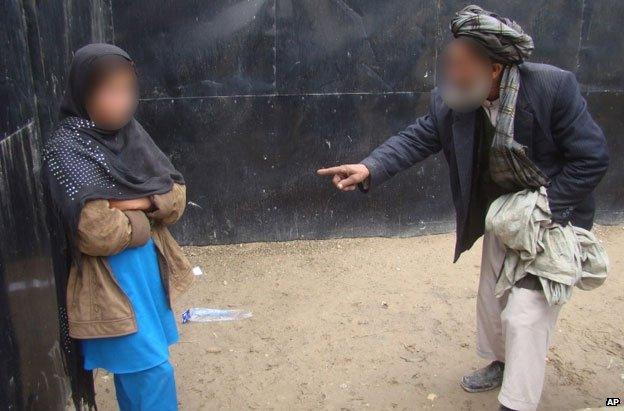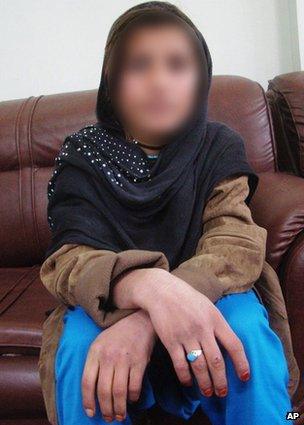Suicide vest nine-year-old tells her story
- Published

Spozhmai's father visited her to try to persuade her to come home
A young girl was detained at a checkpoint in southern Afghanistan wearing what officials said was a suicide vest. Spozhmai, who says she is nine years old, is now in the protective custody of the provincial government. This is her story in her own words.
It was late evening, the mullah was calling for prayers and my brother took me outside and told me to put on this vest. He showed me how to operate it, and I said: "I can't - what if it doesn't work?" And he said: 'It will, don't worry.'
I was scared and he took the vest back from me and he hit me hard, and I felt scared. Then [he gave me back the vest and] left me near the checkpoint where he said I had to operate it.
I realised it was a suicide vest because it was heavier than a normal one.
He said: "If you operate this on the people at the checkpoint, they will die - you will not die." But I knew it was a suicide vest and I would die too. Then he went back home - the checkpoint is just near our house.

After my brother left me… I slept in the desert and didn't see anyone that night.
In the morning, a guy from the checkpoint came and took me to the checkpoint and said: "You need to tell your story to our commander." They found me, I didn't find them.
When I told the commander my story he told me to go back home and I said: "No, they beat me there and I am not treated well."
He said: "OK, well if you're not going home then we have to take you to the provincial capital." That's when they brought me [to Lashkar Gah and] I spoke to another commander, the senior commander, and that's how I come to be here.
Even if the government says it will guarantee my safety I am not going back - the same thing will happen again. They told me: "If you don't do it this time, we will make you do it again."
My father came here and told me to go back and I said: "No, I will kill myself rather than go with you."
I don't have a mother, I have a stepmother and she was not very nice to me.
I did everything at home. I cooked, I made bread, I washed clothes, I cleaned the whole house and they still weren't happy - they would treat me badly, as if I was a slave.
I didn't go to school because they didn't let me. I can't read a word, I can't pronounce anything. It's because I wasn't taught - nobody taught me how… of course I want to go to school.
My brother told me: "You're here in this world and you will die. You are not here to learn or to do other things or to expect that your word will carry any weight. You are here just to die and do your duty."
Of course my Dad knew - they were all in it together. [This started with] my Dad first, and then my brothers were included. They were all in it together.
I haven't spoken to [my brother] since the incident - I haven't seen him since.
I want the government to let me stay here and not make me go back, otherwise the same thing will happen to me again.
What can I say to [my family]? Even if I saw them again I would tell them: "I am not coming home. I am not coming with you."
I have seven sisters and five brothers - three of my sisters are married and the others are little.
One of my brothers is in the Taliban so I have never seen him, one of my brothers is married, and another one - a younger one, is the one who told me to do this. I can't tell his age but he's a big boy and has a beard.

"Dozens of teenage boys who wanted to carry out suicide attacks have been arrested over the past few years, but Spozhmai is the first 'would-be female child suicide bomber' in the country held in protective custody," says Dawood Azami of the BBC World Service.
"Initially, it emerged she was arrested at night when the police heard her crying on the other side of the river where she says she was forced to wear the vest. Then it was said she was arrested at home. But now, she says she spent the night outside on her own and was found by the police in the morning.
"It was first reported that she was wearing a suicide vest at the time of her arrest. But later it emerged that she was not wearing it and her handlers fled with the vest. Her age is also a question of debate. The first official version said she was eight. Other officials later said she was 10. But now she says she is nine.
"The Taliban have rejected all the allegations, calling them 'part of the usual propaganda campaign to defame them'. And they regard the appointment of children, especially girls, in their ranks as wrong."
Spozhmai spoke to Newsday on the BBC World Service.
Follow @BBCNewsMagazine, external on Twitter and on Facebook, external